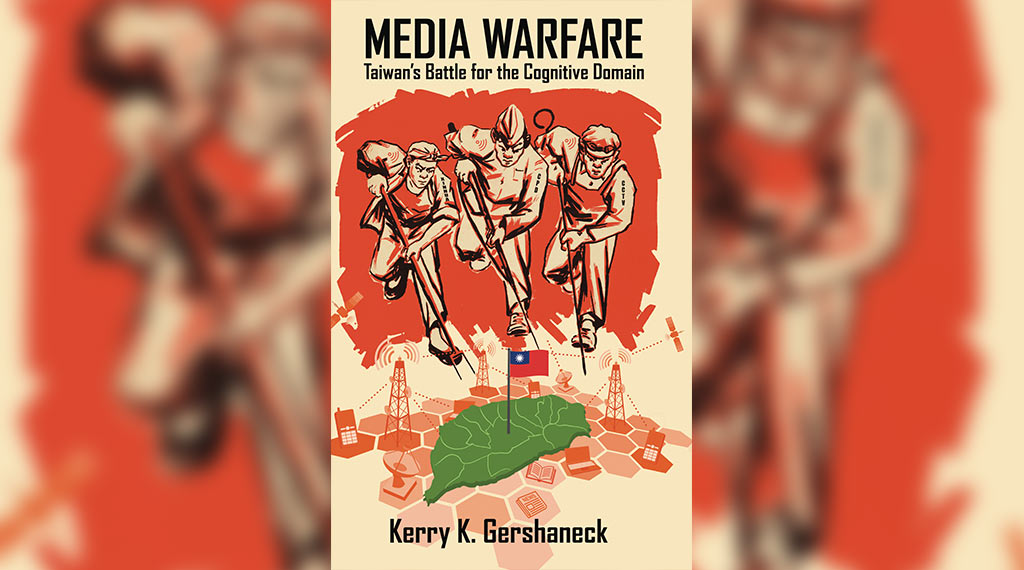Webinar – Media Warfare: Taiwan’s Battle for the Cognitive Domain

On Wednesday, October 6, the Center for Security Policy marked the release of its newest book, “Media Warfare: Taiwan’s Battle for the Cognitive Domain,” with a webinar featuring author Kerry Gershaneck. The Center’s China Program Coordinator Adam Savit moderated.
Gershaneck’s book is a guide to help democracies identify the many attack vectors employed by the Chinese Communist Party’s Media Warfare apparatus in its efforts to “win without fighting.” Beijing seeks to undermine and weaken competitors not by direct military confrontation but by stirring up domestic friction and discontent. Using evidence from Taiwan’s experience, the author shows how the targets of the CCP’s Media Warfare apparatus will be too exhausted to resist the CCP’s advances. Look no further than Hong Kong to understand the end game of this strategy. In the book, Professor Gershaneck provides detailed recommendations that will assist Taiwan to remain secure in the face of continued–and ever-evolving– CCP Media Warfare expected in the future. Taiwan is often the test-bed for strategies Beijing eventually uses against other democracies like the United States.
Gershaneck: China’s Military, Political and Media Warfare are inseparable
Kerry Gershaneck explains how the People’s Liberation Army is inseparable from the political and media warfare China conducts throughout the world in the Center’s latest webinar.
When asked about China’s recent massive aerial incursions into Taiwan’s air defense identification zone, Gershaneck emphasized that military, political and media modes of warfare are inextricably linked in Beijing’s doctrine and practice. The incursions are preparation for actual kinetic warfare in the skies, as well as an effort to psychologically “terrorize the government and people of Taiwan” until they lack the will to effectively fight back.
China has used the circumstances of COVID-19 to put its unrestricted media war on Taiwan “on steroids,” both to weaken Taiwan as an entity and to deflect any responsibility it may have had for the beginning of the epidemic. Beijing has ensured that Taipei be excluded from the World Health Organization, and it squashed publicization of Taiwan’s successes in mitigating COVID-19. The PRC even attempted to disrupt Taiwan’s 2020 election by spreading rumors on social media that “unknown Wuhan pneumonia” was running rampant on election day.
Gershaneck stressed that all party-state organizations in the PRC, including the People’s Liberation Army, are leveraged in support of Beijing’s Media Warfare objectives, giving them a unity of purpose that is lacking in Taiwanese and American government and social structures. He contended that the U.S. government “doesn’t have a plan for this,” although it was starting to formulate one in the last administration under National Security Council official Matt Pottinger and Secretary of State Mike Pompeo. Hopefully, this book will provide a blueprint for future policymakers who take the threat of Media Warfare seriously.
For more on this crucial national security topic, buy “Media Warfare: Taiwan’s Battle for the Cognitive Domain” from Amazon, and be sure to check out the full webinar program below:
Webinar – Media Warfare: Taiwan’s Battle for the Cognitive Domain
This panel features discussion of newly released Center for Security Policy Press book, “Media Warfare: Taiwan’s Battle for the Cognitive Domain,” by Kerry Gershaneck. Gershaneck’s book is a guide to help democracies identify the many attack vectors employed by the Chinese Communist Party’s Media Warfare apparatus in its efforts to “win without fighting.”
- Nearly half say coronavirus is man-made; 29% say it was intentionally released - February 17, 2022
- Americans back total boycott of Beijing Olympics under certain conditions - December 13, 2021
- Beijing pushes limits of authoritarian reach with latest celebrity “disappearance” - November 19, 2021
